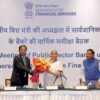Rajeev Chandrasekhar, MoS, MEITY, addressed the G-20 Summit held in Mumbai through a video conference
Nandan Nilekani indicates that the most important Data for Development is one’s own data:
The Indian government will soon start collecting uniform and harmonised anonymized datasets under the national data governance framework policy, said Rajeev Chandrasekhar, Minister of State for Electronics, IT, Skill Development and Entrepreneurship. He was addressing the meeting of the working group related to development work under the G-20 Summit held in Mumbai through a video conference.
On the theme ‘Data for Development,’ he said that India has a vibrant startup ecosystem and a robust AI ecosystem. “So, we expect companies to increasingly use this large database to train their AI models. We aim to spur innovation and create more effective policies and pragmatic solutions. For long-term development, developed and developing nations need to work together,” he said.
Chandrasekhar highlighted the importance of digital data and data-driven interventions for adaptive growth. Stressing the need to put essential safeguards against the misuse of data and putting in place a framework for this purpose, the minister added, “We must view the digital economy through a combined prism of trust and protection. It is critical that we find the right balance between data sovereignty and protection on one hand, and the notion of a data commons that could benefit the global community. We must work together to build a new international framework for technology, digital internet, and indeed data that mainstream the public good and sustainable development”.
He further added that the use of datasets through innovative technology will have a far-reaching impact and will benefit development work at the grassroots level and expand digitization. Data will make every political leader, and every government servant accountable to their people.
Financial inclusion
In her keynote address, Queen Máxima of the Netherlands and UN Secretary-General’s Special Advocate for Inclusive Finance for Development said that financial inclusion is a powerful tool for development. Eight of the 17 SDGs highlight it as a way to help achieve zero poverty, no hunger, good health, gender equality and economic growth.
Nandan Nilekani, Non-Executive Chairman, Infosys, and former Chairman, UIDAI, said that the most important data for development is one’s own data. This is where the unique Indian architecture of data empowerment allows individuals and small businesses to use their own data to get access to various services, which is transformational.
The D4D side event also hosted two breakout sessions on ‘Rejuvenating Legacy Systems: From Data to Public Value Intelligence’, and ‘Models for the Future: Leveraging IoT, Big Data and AI for the SDGs.’
Abhishek Singh, President and CEO of NeGD, said: “When we have had access to data, it results in great benefits. For example, in Meghalaya, the monitoring of pregnant women’s health data through an app led to better access to safe delivery mechanisms leading to lesser maternal mortality rates.”
Power of data
Saqr Bin Ghalib, Executive Director, UAE Office of AI, Digital Economy, and Remote Work Applications said: “UAE has always been thinking of ways to reimagine the delivery of public services by leveraging the power of the #internet and data.”
Yoichi Iida, Deputy Director General for G7/G20 Relations at the Japanese Ministry of Internal Affairs and Communications, said: “G20 can allow the exchange of information for using data and set standards for data exchange. India is a real leader in this and we have a lot to learn from it. Perhaps India can establish a framework for shaping standards of data governance.”
According to Anita Gurumurthy, founding member and executive director of IT for Change, the key question for developing countries is how to democratise data. One way is to create a baseline for data availability – through a people-centred view of data. “We need rule of law, elimination of harm when generating and using data,” she said.
Anir Chowdhury, Policy Advisor, Government of Bangladesh, advocated: “As we include the excluded, we must ensure the digital divide can be overcome. The G20, as a grouping of developed and developing countries, can help establish a global cooperation framework on data sharing, learning, and amplification.”
Shamika Ravi, Vice President, Economic Policy, Observer Research Foundation, explained: “When institutions become data hungry, we also have to create the necessary infrastructure to harness that data properly. We need proper regulations.”








